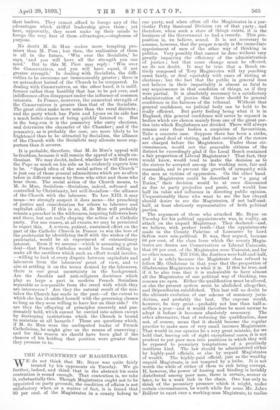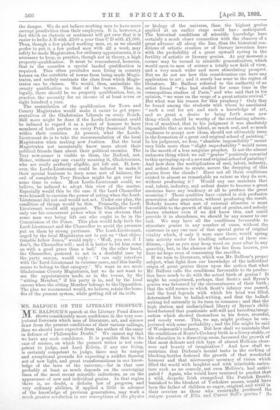THE APPOINTMENT OF MAGISTRATES.
WE do not think that Mr. Bryce was quite fairly treated by his opponents on Tuesday. We go further, indeed, and think that in the abstract his main contention is sound enough. That contention is, we take it, substantially this. Though Magistrates ought not to be appointed on party grounds, the condition of affairs is not satisfactory when, as a matter of fact, it is found that 80 per cent. of the Magistrates in a county belong to one party, and when often all the Magistrates in a par- ticular Petty Sessional Division ere of that party ; and therefore, when such a state of things exists, it is the business of the Government to find a remedy. This pro- position is, we believe, sound. It is not necessary to assume, however, that the proper remedy is the immediate appointment of men of the other way of thinking in politics. Very .possibly that cannot be done without very greatly impairing the efficiency of the administration of justice ; but that some change must be effected, we do not doubt. It may be true that a Bench en- tirely composed of Tory Magistrates will try poaching cases fairly, or deal equitably with cases of rioting at elections ; but the fact that the public in general does not believe in their impartiality is almost as fatal to any acquiescence in that condition of things, as if they were partial. It is absolutely necessary to a satisfactory administration of justice that there should be general confidence in the fairness of the tribunal. Without that general confidence, no judicial body can be held to be really efficient. But party feeling being what it is in England, this general confidence will never be reposed in bodies which are chosen mainly from one of the great par- ties into which Englishmen are divided. There will always remain over those bodies a suspicion of favouritism. Take a concrete case. Suppose there has been a strike, and a good deal of rioting, and that certain of the rioters are charged before the Magistrates. Under these cir- cumstances, would not the peaceable citizens of the district be exceedingly glad if the Local Bench contained a fair proportion of Liberal Magistrates F That fact, they would know, would tend to make the decision as to the rioters be accepted among the working men, fair and reasonable, and to prevent the growth of sympathy with the men as victims of oppression. On. the other hand if the Magistrates could be described as " a gang of Tories," their decision would be at once discounted as due to party prejudice and panic, and would lose half its value and influence in directing public opinion. Unquestionably those who want to see the law obeyed should desire to see the Magistrates, if not half-and- half, at least obviously representative of both political parties. The argument of those who attacked Mr. Bryce on Tuesday for his political appointments was, in reality, an attack on the unpaid Magistracy. They declared—and, we believe, with perfect truth—that the appointments made in the County Palatine of Lancaster by Lord Sefton were non-political. It was, they argued, because 80 per cent. of the class from which the county Magis- trates are drawn are Conservatives or Liberal Unionists, that 80 per cent. of the Magistrates were Unionist, and for no other reason. Till 1886, the Justices were half-and-half, and it is solely because the Magistrate class refused to follow Mr. Gladstone in that year that the proportion of Gladstonian Magistrates is what it is. If this be true, and if it be also true that it is undesirable to have almost all the Magistrates of one political way of thinking, two courses are open. Either the qualification must be altered, or else the present system must be abolished altogether, and Stipendiaries established. This last will no doubt be the ultimate evolution of our scheme of summary juris- diction, and probably the best. The expense would, however, be very great—probably not less than half-a- million a year—and it would therefore be most unwise to adopt it before it becomes absolutely necessary. The other alternative, that of reducing the qualification, does not, of course, mean that it should become the regular practice to make men of very small incomes Magistrates. That would in our opinion be a very great mistake, for we hold that, leaving out of sight exceptional cases, it is not prudent to put poor men into positions in which they will be exposed to pecuniary temptations of a peculiarly insidious kind. The law should be administered either by highly-paid officials, or else by unpaid Magistrates of wealth. The highly-paid official, just as the wealthy unpaid Magistrate, is not tempted by a bribe. It is not worth the while of either of them to risk being corrupt. If, however, the power of loosing and binding is lavishly distributed among poor men, there is certain, sooner or later, to be a weak link in the chain. One has only to think of the pecuniary pressure which it might, under certain circumstances, be worth while for some Mr. Jabez Balfour to exert over a working-man Magistrate, to realise the danger. We do not believe working men to have more corrupt proclivities than their employers. It is, however, a fact which no rhetoric or sentiment will get over that it is easier to bribe A B with £100 a year than C D with £1,000. Thus, though a few picked working men, or, as we should prefer to put it, a few picked men with £2 a week, may safely be made Magistrates, for ordinary appointments, it is necessary to keep, in practice, though not in theory, a high property-qualification. It must be remembered, however, that in the counties a special landed qualification is required. This often precludes men living in country houses on the outskirts of towns from being made Magis- trates, and unduly contracts the class from which Magis- trates can be chosen. We would, then, assimilate the county qualification to that of the towns. That is, legally, there should be no property qualification, but, in practice, the necessity for an income of at least seven or eight hundred a year. The assimilation of the qualification for Town and County Magistrates would make it easier to get repre- sentatives of the Gladstonian Liberals on every Bench. Still more might be done if the Lords-Lieutenant could be induced to regard it as a point of honour to have members of both parties on every Petty Sessional Bench within their counties. At present, what the Lords. Lieutenant do is to take the recommendation of the local Magistrates when making new Justices. But the local Magistrates not unnaturally know more about their political friends than about their political enemies. The Tory new-comer is visible to them, the Radical, not. Hence, without any one exactly meaning it, Gladstonians, who are really perfectly eligible, get left out. If, how- ever, the Lords-Lieutenant could be induced to make it their special business to keep some sort of balance, the evil of completely Tory Benches might be got over for some time to come. Most Lords-Lieutenant could, we believe, be induced to adopt this view of the matter. Especially would this be the case if the Lord Chancellor were himself to exercise the power of acting when the Lord- Lieutenant did not and would not act. Under our plan, the condition of things would be this. Primarily, the Lord- Lieutenant would still appoint. The Chancellor would only use his concurrent power when it was obvious that some man was being left out who ought to be in the Commission of the Peace. This plan would help both the Lord-Lieutenant and the Chancellor to avoid the pressure put on them by strong partisans. The Lord-Lieutenant, urged by the local Magistrates not to put on " that objec- tionable fellow Jones," would reply : Well, you see, if I don't, the Chancellor will ; and it is better to let him come on with a good grace than a bad.' On the other hand, the Chancellor, pestered to act in a doubtful case by the party caucus,, would reply : ' I can only interfere with the Lord-Lieutenant in extreme cases, and this hardly seems to belong to that category.' We want to see more Gladstonian County Magistrates, but we do not want to see the appointments made, as in the towns, by the " sitting Member," if his party is in, and by the local caucus when the sitting Member belongs to the Opposition. The plan we recommend would, we believe, retain the bene- fits of the present system, while getting rid of its evils.



















































 Previous page
Previous page